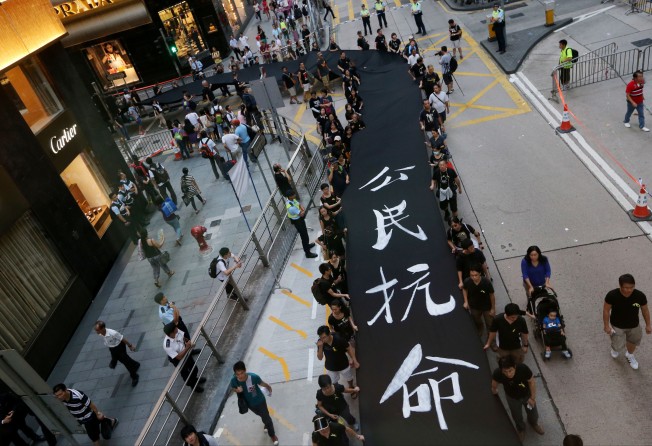Civil disobedience reflects widespread dissatisfaction with government

Your paper published a letter from Mark Peaker that claimed the level of law enforcement in this city is "laughable" and this encouraged young people to take to the streets to protest ("Enforcement of the law laughable", September 15). He writes that, "Students are confident about engaging in civil disobedience and breaking the law because they believe they shall get away with it".
Mr Peaker does not seem to understand that civil disobedience is to symbolically break the law to question the legitimacy of authority. To argue that students will break laws just because they can is both a misreading of human nature and of our relationship with authority.
People do not break the law because they can, just as we do not abide by it because it is rigorously enforced. We abide by the law because we believe in what the law represents.
Students and the majority of Hong Kong people do not believe the framework for political reform proposed by the National People's Congress Standing Committee will provide the democratic reform this city so desperately needs.
This is not for any high democratic ideal, and certainly not for any separatist leanings; it is because Hong Kong people want to believe again that they have a government that will listen to their concerns over housing, on how public money is being used, on cross-border immigration, the decline in press freedom and the deteriorating quality of life for the vast majority of Hong Kong residents.
Surveys show that the majority of Hong Kong people would reject the proposed framework, and that this majority is highest among the younger and educated. Many of those who would vote in favour of the proposal would do so only out of a sense of resignation.
The act of civil disobedience proposed by the Occupy Central movement may not be to everyone's liking, but its motivation, the dissatisfaction it represents and what it seeks to challenge is representative of both a reasonable and overwhelmingly popular position.
Civil disobedience is supported, if not in action then in principle, by far more than, in Mr Peaker's words, "vocal protesters who still have their underwear washed and ironed by their mothers". Most students I know wash their own clothes. Every person I know living, as Mr Peaker does, on The Peak does not.
The act of breaking the law is a considered and calculated gambit. It may prove to be a poor bet. However, I, for one, consider Hong Kong people above the need to be coerced into abiding by the law.
Evan Fowler, Fo Tan